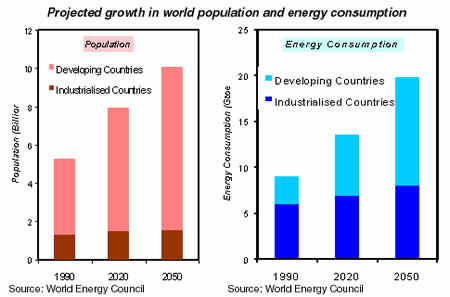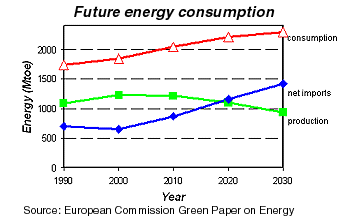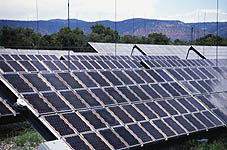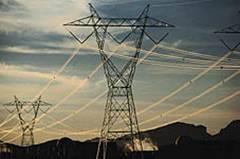Contents
Introduction to Energy
Why we need Energy
Projected Growth
Future Directions
Protecting the environment
Consequences of energy dependence
Sustainable Energies options
Fuel Cells and Hydropower
Fossil fuel
Energy storage and distribution
Cleaner Energy Trends & New Businesses & Products to Emerge
Opinions & Comments on - Methane Hydrate – Our Long Term Energy Solution
General Review
References
Introduction
Energy is fundamental to the quality of our lives. In modern times we are totally dependent on an abundant and uninterrupted supply of energy for living and working.
It is a key ingredient in all sectors of modern economies.
We know that energy demand will increase significantly in the future. The question being raised is, how will we satisfy the huge energy requirement in an environmentally friendly way?
Energy provides us with heat and electricity daily. It powers our industry, transport and modern way of life.
Why do we need Energy?
We use it constantly in our homes, at work and for leisure. Energy maintains our standard of living and economy. In modern times we take it for granted that energy is available whenever we want it.
In previous times candles were the main source of lighting, they were used to light our homes before the industrial revolution.
Wood or coal fires provided heat for cooking food and for keeping us warm.
Walking was then the only form of transport for most people.
Since then, a vast array of energy devices and systems has been developed.
These transform energy from sources provided by nature (coal, oil, gas, wind, sun and nuclear fuels) into other forms that we can use. As the population expands so do our energy demands.
We use energy in our daily lives to provide heat and electricity:
In our homes for lighting, domestic appliances, televisions, computers, etc;
In factories to power the manufacture of the products we use everyday; and in
Transportation from cars, lorry’s ships and airplanes to transport people and goods.
Projected Growth
Energy demand will double by the year 2050 world-wide energy demand is projected by the World Energy Council to be at least double its present level.
At the same time, we can expect further economic growth and rising living standards.

The most reliable predictions indicate that by 2050, the world's population will have nearly doubled from its present level. It will rise from around 6 billion to about 10 billion people. Most of this growth, and much of the increase in energy consumption, will occur in developing countries.
Future directions
Energy supply must be sustainable and diverse. And energy needs to be used more efficiently.
A sustainable energy supply, both in the short- and the long-term, is needed for promoting both economic development and people's quality of life, as well as protecting the environment.
We also need a greater diversification of energy resources - if we are largely dependent on one fuel source, we risk price rises and supply disruptions.
Energy is a precious resource which must be conserved. Improved energy efficiency, therefore, in our homes, factories and transport needs to be strongly encouraged.
Protecting the environment
Damage to the environment is reason enough to promote alternative environmentally friendly energy sources.
A number of the global-scale environmental degradation we see today is due to the adverse effects of energy production and use. The burning of fossil fuels produces carbon dioxide, one of the greenhouse gases.
There is a growing concern about global warming, that these gases can cause. At present, fossil fuels produce most of our energy. Some energy comes from nuclear power stations and a small amount from renewable sources. Nuclear power and renewables do not produce greenhouse gases.
External energy supplies
If present trends continue, increasing demand will cause rising imports of energy.

An increased dependence on energy imports means that the cost and supply of a vital resource for our economy slips further and further out of our control.
Moreover, we may become more exposed to the results of political instability in the regions where fossil fuels are produced.
Consequences of energy dependence
The consequences are likely to be higher energy prices.
There is also likely to be more uncertainty about supplies and greater environmental risk as less easily accessible reserves of fossil fuels are exploited.
Future increases in energy demand will exert even greater pressure on our finite reserves.
Sustainable / Renewable Energies
A suitable definition for sustainable energy, then, "is energy which is replenishable within a human lifetime and which causes no long-term damages to the environment.

Renewable energies can help diversify energy supply with little adverse environmental impact.
Renewable energy sources tap naturally occurring energy flows to produce electricity, heat and fuel. Such resources are often produced on a stand-alone use close to their point of consumption.
Renewable sources are: -
Wind - harnessing the naturally occurring energy of the wind to generate electricity, both onshore and offshore.
PV projects in FP6 - using semi-conductor materials to capture the energy in sunlight and to convert it directly into electricity.
Biomass - converting organic matter such as wood, plants and agricultural waste to provide heat, produce fuel and generate electricity.
Concentrated Solar Power - concentrating the energy of the sun to generate electricity or provide heat. (As shown above)
Ocean Energy Systems - exploiting energy from the ocean such as tidal currents and waves to generate electricity.
Geothermal - using steam and hot water generated by heat from the earth's crust to produce electricity and provide heating.
Hydropower - harnessing the energy available in flowing water to generate electricity.
By being self-sustaining the energy source is in essence limitless. Solar energy, wind energy, geothermal energy, hydropower and biomass are all self-sustaining.
They all have sources that cannot be depleted. These energy sources allow for the conservation of other energy sources, like trees that would have been used for charcoal production. Using these "renewable" energies also encourages the protection of the environment which traditional energy sources have helped to destroy.
The use of some traditional energy sources, like oil and charcoal, the Natural Resources Conservation Authority (NRCA) reported "carries with it a number of environmental problems, such as water and air pollution and the contamination of soils." Utilizing sustainable energy would then lead to the conservation of the environment which would eventually lead to a development which meets the needs of the present, without compromising the ability of future generations to meet their own needs.
In other words, sustainable energy use leads to sustainable development.
Fuel Cells and Hydropower
Fuel cells may, in the long term, replace most current combustion systems in all energy end-use sectors, from electric vehicles to power plants. Fuel cells are expected to play a major role in the future supply of energy for both mobile and stationary applications. Such cells use hydrogen which can be derived from a number of other fuels.
Research topics:-
Fuel cells- essentially an electrochemical energy converter that basically combines hydrogen with oxygen to produce water, electricity and heat. There is no combustion and no greenhouse gas or other polluting emissions are produced.
Hydrogen - probably the most promising alternative fuel for the future. Used in fuel cells, it can form the basis of an intrinsically clean, efficient and quiet energy supply.
Cleaner energy production from fossil fuels
With fossil fuels, the research focus is on improving efficiency while reducing costs and global and local environmental impact. Fossil fuels are the conventional energy sources that currently dominate the world's energy supply.
Fossil fuel research topics:
Coal - reducing carbon dioxide (CO2) emissions and other environmental impacts caused by solid fuel combustion, by developing cleaner technologies.
Oil - developing more efficient exploration, extraction and production technologies for hydrocarbons.
Gas - improving the energy conversion efficiency of gas combustion processes, particularly by using advanced gas turbines.
CO2- reducing greenhouse gas emissions by ensuring that the CO2 produced by electrical
Power-plants is not released into the atmosphere.
Energy storage and distribution
Research on technologies for storing and distributing all types of energy at both micro and macro scale, from electric vehicles to grid-connected power plants.

This includes technologies for improving the efficiency, stability, reliability and safety of energy storage, transmission and distribution. The technologies are applicable for both mobile and stationary applications.
Research topics:
Storage - providing reliable and cost-efficient energy storage technologies, including liquid natural gas, liquid petroleum gas, hydrogen and advanced (technology) batteries.
Distribution - developing technologies for improving the transmission and distribution of electricity, gas and other fuels, and heating and cooling.
Integration of renewable energy sources and distributed generation - overcoming both the technical and non-technical problems associated with integrating new distributed energy resources into energy systems
Reduced energy consumption
Reducing the energy intensity of demand and using energy much more effectively will be a major step towards achieving a sustainable energy system.
Research addresses energy conservation and use in:
Buildings - reducing EU energy requirements by 30% by 2010 and 50% in the longer term are the research aims. Currently, the built environment in the EU accounts for about 40% of the total energy requirements.
Transport - improving the energy and environmental performance of vehicles and the related infrastructure.
Industry - developing and demonstrating processes and process control technologies aimed at securing a reduction in energy demand in the manufacturing and agriculture sectors.
Cross-cutting issues
Research on all those aspects that impact on energy markets and thus on the move towards a sustainable energy supply.
This is necessary because the move towards a sustainable energy supply does not rely solely on the development of new technologies.
Such aspects include:
Socio-economic research - assessing and monitoring the impact of all energy options on society, the environment, the economy and employment. Policy-related research - studying the impact and consequences of policies and measures related to energy supply and demand, the economy and the environment.
Modelling - analysing different strategies for energy production and use, and elaborating short- and long-term scenarios to improve sustainability.
Cleaner Energy Trends & New Businesses & Products to Emerge
Due to the increase of interest and change in political over recent years from governments pressurized by people who’s concern is for the long term benefit of the planet and not their own pockets, cleaner living and helping the environment to cope with the demands from businesses and the human race, a new kind of businesses has sparked up which have made great process in promoting and energy saving products and services to the masses.
The growth in this sector has greater potential as the awareness is gaining momentum and new companies are having a positive impact on the environment and people demanding cleaner solutions.
Clean Edge - Company
The company was launched in 2001 by environmental and high-tech business pioneers Ron Pernick and Joel Makower, Clean Edge is a leading clean-tech research and consulting firm with offices in the San Francisco, Bay Area and Portland, Oregon.
They provide a variety of services including research and publishing, strategic consulting, and co-producing the annual Clean-Tech Investor Summit. Clean Edge tracks and analyzes clean-tech markets, trends, and opportunities and offers unparalleled insight and intelligence to its customers through an extensive network of partners and affiliates.
In May 2006, the company launched the NASDAQ Clean Edge US Index® which tracks US-listed clean-energy companies. For more information about Clean Edge, e-mail [email protected], or call 503.493.8681
Clean Edge – Other Linked areas
Market Research Reports including the annual Clean-Energy Trends report and other sponsored publications.
The NASDAQ® Clean Edge® U.S. Index – a benchmark index which tracks U.S.-listed clean-energy companies.
The Clean-Tech Investor Summit – the premier clean-tech conference and networking opportunity of the year. Strategic Consulting for companies ranging from start-ups to multinationals; governments to non-profits.
Retail Making A Positive Impact
There are so many amazing ethical and environmental products out in the market place making a difference creating awareness to the masses. Find below a small selection of companies with stores selling a wide range of items that is benefiting the environment.
Love Eco
Contemporary eco-friendly gifts and home accessories - gift ideas, clothing, linen, skincare, soft toys and much more.
All Love Eco products are either recycled, organic, fair-trade, energy-saving or sustainable.
Tel: 01223 313 409
Email: [email protected]
Website: http://www.love-eco.co.uk/
MAD*
Mad* stands for Make a Difference - and all products promoted by Mad* are from organic, fair-trade or sustainable resources. So you can rest easy, knowing that you can make a difference - without sacrificing quality, simply by the way you spend.
Tel: 01483 418829
Email: [email protected]
Website: http://www.themadshow.co.uk/
The Natural Store
The Natural Store - the definitive Online Store with a stylish mix of ingredients from fashion to interiors, beauty to food, baby-wear to garden products. 2.5 pence of every pound you spend is donated to 1 of 5 charities.
Tel: 01273 746781
Email: mailto:%[email protected]
Website: http://www.thenaturalstore.co.uk/
The Green Apple
Stylish and unique products that have been made without exploiting people, animals or the environment. 1% of all pre-tax profit goes to charity.
Email: mailto:%[email protected]
Website: http://www.the-green-apple.co.uk
Ecotopia
The online green shop that offers you a wide range of interesting and innovative environmental products.
Tel: 01453 887 547
Email: [email protected]
Website: http://www.ecotopia.co.uk/
Novera Energy – UK Company

